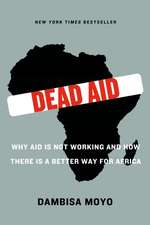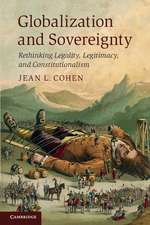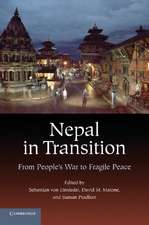After Defeat: How the East Learned to Live with the West: Cambridge Studies in International Relations, cartea 118
Autor Ayşe Zarakolen Limba Engleză Paperback – 22 dec 2010
| Toate formatele și edițiile | Preț | Express |
|---|---|---|
| Paperback (1) | 289.95 lei 43-57 zile | |
| Cambridge University Press – 22 dec 2010 | 289.95 lei 43-57 zile | |
| Hardback (1) | 722.19 lei 43-57 zile | |
| Cambridge University Press – 22 dec 2010 | 722.19 lei 43-57 zile |
Din seria Cambridge Studies in International Relations
-
 Preț: 198.90 lei
Preț: 198.90 lei -
 Preț: 232.37 lei
Preț: 232.37 lei -
 Preț: 237.58 lei
Preț: 237.58 lei -
 Preț: 210.70 lei
Preț: 210.70 lei -
 Preț: 190.01 lei
Preț: 190.01 lei -
 Preț: 200.87 lei
Preț: 200.87 lei - 8%
 Preț: 401.24 lei
Preț: 401.24 lei -
 Preț: 229.56 lei
Preț: 229.56 lei -
 Preț: 265.70 lei
Preț: 265.70 lei -
 Preț: 200.09 lei
Preț: 200.09 lei -
 Preț: 207.82 lei
Preț: 207.82 lei -
 Preț: 158.77 lei
Preț: 158.77 lei -
 Preț: 162.49 lei
Preț: 162.49 lei -
 Preț: 231.47 lei
Preț: 231.47 lei - 11%
 Preț: 584.77 lei
Preț: 584.77 lei -
 Preț: 241.77 lei
Preț: 241.77 lei -
 Preț: 287.87 lei
Preț: 287.87 lei -
 Preț: 209.13 lei
Preț: 209.13 lei -
 Preț: 299.23 lei
Preț: 299.23 lei -
 Preț: 286.13 lei
Preț: 286.13 lei -
 Preț: 287.87 lei
Preț: 287.87 lei - 11%
 Preț: 641.67 lei
Preț: 641.67 lei - 11%
 Preț: 585.78 lei
Preț: 585.78 lei - 14%
 Preț: 843.23 lei
Preț: 843.23 lei -
 Preț: 303.80 lei
Preț: 303.80 lei -
 Preț: 200.79 lei
Preț: 200.79 lei -
 Preț: 284.78 lei
Preț: 284.78 lei -
 Preț: 279.76 lei
Preț: 279.76 lei -
 Preț: 285.75 lei
Preț: 285.75 lei -
 Preț: 324.24 lei
Preț: 324.24 lei -
 Preț: 290.16 lei
Preț: 290.16 lei -
 Preț: 291.69 lei
Preț: 291.69 lei -
 Preț: 392.52 lei
Preț: 392.52 lei -
 Preț: 315.99 lei
Preț: 315.99 lei
Preț: 289.95 lei
Nou
Puncte Express: 435
Preț estimativ în valută:
55.50€ • 60.31$ • 46.65£
55.50€ • 60.31$ • 46.65£
Carte tipărită la comandă
Livrare economică 21 aprilie-05 mai
Preluare comenzi: 021 569.72.76
Specificații
ISBN-13: 9780521145565
ISBN-10: 0521145562
Pagini: 312
Ilustrații: black & white illustrations
Dimensiuni: 159 x 227 x 14 mm
Greutate: 0.5 kg
Ediția:New.
Editura: Cambridge University Press
Colecția Cambridge University Press
Seria Cambridge Studies in International Relations
Locul publicării:Cambridge, United Kingdom
ISBN-10: 0521145562
Pagini: 312
Ilustrații: black & white illustrations
Dimensiuni: 159 x 227 x 14 mm
Greutate: 0.5 kg
Ediția:New.
Editura: Cambridge University Press
Colecția Cambridge University Press
Seria Cambridge Studies in International Relations
Locul publicării:Cambridge, United Kingdom
Cuprins
Introduction; Part I. Of Gates and Keepers in the International System: 1. Outsiders and insiders in the international system; 2. States as outsiders; Part II. An Imperial Message: 3. The 'barbarians': Turkey (1918–39); 4. The 'children': Japan (1945–72); 5. The 'enigma': Russia (1990–2007); 6. Conclusion: 'Zealots or Herodians'?
Recenzii
'A highly sophisticated and impressive book that provides an important contribution to the role of identity in IR. By focussing on three key 'interstitial' states - Japan, Russia and Turkey - which have been located on the 'inferior' side of the 'established-outsider' organising principle of international society, Ayse Zarakol advances a novel understanding of IR that goes beyond extant constructivist and English School theories.' John M. Hobson, University of Sheffield
Notă biografică
Descriere
This book demonstrates how a sense of stigma has shaped the foreign policies of states torn between the East and the West.
















